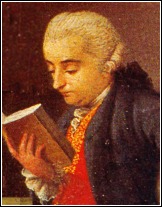| Profile | Major Works | Resources |
Cesare Beccaria, 1738-1794

Cesare Marchese di Beccaria Bonesana (often simplified to "Cesare Beccaria") was a Milanese nobleman, Enlightenment philosopher and one of the fathers of utilitarianism and the Italian economic tradition.
The Beccaria (archaically Beccheria) were an illustrious aristocratic family of Lombardy. During the Middle Ages, the Beccaria were leaders of the Ghibelline faction inside Pavia and close allies of the Visconti lords of Milan. It is historically coincident that Cesare di Beccaria Bonesana was born in Milan in 1738, a product of the marriage of Gian Saverio Marquis of Beccaria Bonesana and Maria Visconti.
Between 1746 and 1754 Beccaria was educated at the Collegio dei Nobili in Parma run by Jesuits, receiving what he would later describe as "a fanatical education". He went on to study law at the University of Pavia, obtaining his degree in 1758, but his primary interests were in mathematics and natural sciences. After returning to Milan, Beccaria married Teresa Blasco.
Beccaria soon fell in with a group of aristocratic young Milanese intellectuals, which included the brothers Pietro Verri and Alessando Verri, Luigi Lambertenghi, and Alfonso Longo. The young men imbibed the spirit of the Enlightenment, emanating from France, that had reached Milan by this time, and saw themselves as its propagators. In 1761, they founded the "Società dei Pugni" ("Society of the Fists"), a convivial discussion group, to explore ideas about political, social, legal and economic reform. From 1764 to 1766, the group published the great Enlightenment journal, Il Caffè, where Beccaria and Verri published some of their most famous pieces.
Beccaria's interest in economics were primarily formed by his reading of Montesquieu and Hume. Beccaria's first publication (1762) was on monetary reform. Beccaria argued that the value of goods is in inverse proportion to their quantity and the number of sellers and in direct proportion of competing buyers, of the tax, of the labor force and of the importance of transport (a formula later taken up by Verri). In a brief 1764 note in Il Caffè, Beccaria analyzed the relationship between tariffs and smuggling. Beccaria argued that higher duties increased the incentive to smuggle, thereby leading to a reduction in tariff revenue. His more extensive Elementi (written in 1769, but published only in 1804), were very much influenced by Cantillon.
Beccaria was one of the main developers of the Italian tradition in economics, combining a utilitarian theory of statecraft and a demand-and-supply theory of value (anticipating the Marginalist Revolution).
Outside of economics, Beccaria's most famous work was his 1764 treatise on criminal justice (De delittie e delle pene). Beccaria denounces torture, secret accusations, judicial arbitrariness, inequality in sentencing, and disprortionality between crime and sentence. Beccaria argued that the punishment of criminals should be assessed according to the amount of damage to "social welfare", measured in terms of the utilitarian "greatest happiness for the greatest number" principle (taking a cue from Helvetius). On this criteria, Beccaria argued that punishment must have a preventive rather than punitive function, and consequently trials must be public and fair.
Beccaria's tract turned him into a celebrity across Europe overnight. Abbé André Morellet promptly translated it into French, and Voltaire wrote an extended commentary on it. Beccaria was invited to France, but without his Milanese friends, it was not a success. Over-awed by the philosophes he idolized, the socially awkward and shy Beccaria did not make much of an impression in the Parisian salons, and returned to Italy after merely three weeks. Later, Jeremy Bentham would be much influenced by Beccaria's work.
From 1771, Beccaria was appointed to various positions in the Austrian administration in Milan, and was an economic advisor to the Hapsburg government. Morphing into a bureaucrat, Beccaria did not write much in the latter part of his life. Beccaria's silence fed rumors in Enlightenment circles that he was being prevented from writing, or that his writings were being withheld by Austrian censors, but there is no evidence of this. It seems Beccaria simply disliked being a celebrity and voluntarily gave up the literary life.
|
Major Works of Cesare Beccaria
|
|
HET
|
|
Resources on Cesare Beccaria Contemporary
19th Century
Modern
|
All rights reserved, Gonçalo L. Fonseca
